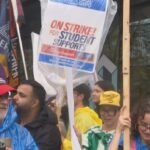For Kingston, Ontario City Councilor Greg Ridge, the pain of food insecurity is personal.
When Ridge was eight years old, his father was injured at work and had to be disabled. Ridge said he remembers wondering why his grandparents suddenly stopped shopping and his parents talked quietly about money.
“I remember one time in the kitchen my mom was crying, and I went up and hugged her and said, ‘Mom, everything is going to be okay,'” the King’s Town councilor said, fighting back his own tears.
“These are things that stay with you for the rest of your life.”
Ridge and the rest of Kingston City Council say the problem is so serious that they declared it an emergency during last week’s council meeting.
“People are drowning. They’re underwater,” Ridge said. “They are working and doing the best they can… but it is not enough. We as a municipality are doing what we can, but it is not enough.”
Public health units across Eastern Ontario describe food insecurity (not being able to afford the foods desired or necessary for good health due to financial constraints) as a growing struggle across the region.
Rachael Mather, a dietician at the Southeast Health Unit, said about one in three households in the Kingston area experienced food insecurity in 2023.
Parents skip meals to feed children
“We are seeing a significant increase in food insecurity locally,” he said, adding that the problem is also increasing nationally.
Mather pointed to figures from Statistics Canada and the PROOF Canada research program, which found estimates of food insecurity across the country were the highest in almost 20 years.
The impacts of food insecurity range from worrying about how to pay for healthy foods to going days without them, according to the dietician.
That forces some people to skip meals, or parents to skip meals to make sure their children eat, but even then there are consequences, he explained.
“We know that children from food-insecure households [are] more likely to experience mental health problems, depression and suicidal thoughts in the future,” Mather said.
Feeding program purchase new high chair
At Martha’s Table, a meal program in Kingston, staff see the reality of food insecurity every day.
Executive Director Ronda Candy said the organization has seen a steady increase in users for years, but it has increased “by 300 percent” since the COVID-19 pandemic.

That “unprecedented growth” means feeding people “from all walks of life, people who are employed, people who are homeless and everything in between,” Candy said.
One symbol of that change is a new high chair that Martha’s Table just purchased to serve some of its youngest customers.
“Seeing children, young people, toddlers and babies arrive is very emotional,” Candy said. “We know the need is there, but seeing it on the front lines is a big challenge.”

Toronto and Mississauga have also declared food insecurity emergencies. They, along with Kingston, are asking higher levels of government for help.
The motion at city hall, presented by Kingscourt-Rideau Coun. Brandon Tozzo and seconded by Ridge, calls on the province to increase social assistance rates to cover basic needs, increase funding for school feeding programs and establish a guaranteed livable basic income.
8:28Food bank providers react to food insecurity emergency in Kingston
The City of Kingston has declared a food insecurity emergency. What does this mean for food banks and local food programs who are on the front lines of this crisis? Dan Irwin of Partners in Mission Food Bank and Ronda Candy of Martha’s Table respond to this statement.
According to a statement to CBC from the Ministry of Children, Community and Social Services, the provincial government has increased Ontario Disability Support Program fees by 17 per cent, tying it to inflation.
He also highlighted tax credits and his decision to raise the minimum wage to $17.20, while noting his continued investments in student nutrition programs and a recent partnership with the federal government.
Ridge said he hopes Kingston’s emergency declaration will sound the alarm and ensure that food insecurity takes center stage as voters consider their options in the upcoming election.
But mainly, he said, it is a way for the municipality to exhaust all options to help those most in need.
“That’s what this motion is trying to do,” the councilor said. “Let’s make tomorrow a better day for everyone.”








